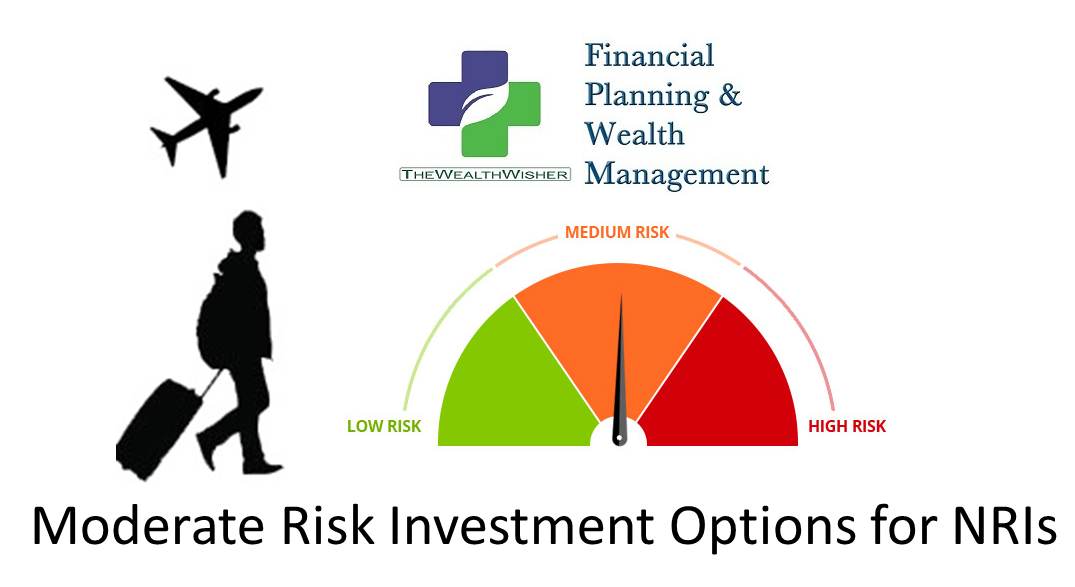With a slight increase in risk, few Investment Options for NRI can yield more returns. One should invest as per his risk profile. A moderate risk category means a small portion of equity or risky asset is included. One can lessen the risk by choosing a suitable horizon as per his reason to invest.
This article will cover the available Investment Options for NRI under the Moderate Risk Category.
Updated till March 2020.
We have also written the following:
Investment Options for NRI – Low-Risk Category (Click To Read)
Investment Options for NRI – High-Risk Category (Click To Read)
Investment Options for NRI – Moderate Risk Options

Hybrid Equity Funds for NRIs
The word Hybrid means, a mix of Equity & Debt. The key objective is to provide diversification as well as asset allocation. They aim to generate capital appreciation through equity and regular return through the debt portion of the portfolio. A fund manager manages these funds dynamically.
Mutual Funds provide many options in Hybrid Category. The classification is based on Equity & Debt composition. Broad categories are:
Aggressive Hybrid Funds: – Aggressive hybrid funds take exposure in both equity & debt securities in proportions specified in the scheme’s investment objective. These funds have to allocate at least 20% of fund assets towards debt instruments. The investment in equity and equity-related instruments varies between 40% to 80%. The manner of stock selection varies from growth to value. Similarly, the selection of debt securities differs from being highly sensitive to low-interest-rate sensitivity. Such funds are best suited to investors who have a moderate risk appetite and medium-term investment horizon of at least 5 years to 7 years.
Conservative Hybrid Funds: Conservative hybrid funds primarily invest in debt securities, with 10-25% of their portfolio going towards equity. The debt portion of these funds is managed dynamically. They may take credit risk, go for duration strategies when appropriate or simply stick to accrual strategies. These funds are best suited to those investors who don’t wish to take much equity risk & wish to enjoy regular inflows from debt-related instruments with investment horizon from 2 to 5 years.
Balance Advantage Funds: These are also called asset allocation funds. The equity & debt composition is based on market factors like PE ratio, PEG ratio & others. Basic idea is to increase equity when the market is cheap & be in debt when it is expensive. These are rebalanced on a monthly basis. These are suited for investors looking at low volatility (ups & downs). The time horizon for investments can be 3-10 years.
Real Estate for NRIs & Rentals
NRI can look at real estate in India & abroad. Income can be from both the sources – Capital appreciation & rental income.
Indian cities like Mumbai, NCR, Bangalore, Hyderabad, Pune, Jaipur & many others have huge potentials in real estate. NRIs prefer these as their home upon returning also.
NRIs can buy real estate through physical possessions or through REITs (Real Estate Investment Trusts).
The rental business is also gaining popularity as one can now invest in overseas properties also. Indian rental yield is less than 2% but the UK, Dubai & other cities offer 3-5%.
Product-wise you must consult and employ a professional to manage these transactions.
Details coverage & Ebook on Real Estate Investment by NRIs – Click Here
ULIP for NRIs
ULIPs or Unit Linked Insurance plans are investments with insurance & fund management combined.
One must look at term insurance for safety needs. But in case you are looking for moderate returns, you may invest in ULIPs.
ULIPs if bought for 8 years plus can offer better returns than a debt under the hybrid option of funds. The key is to hold them for a longer duration. Also as a product, these are costly than MFs. So in case you are looking for returns only, MF score over ULIPS.
P2P for NRI
Peer to Peer or Peer 2 Peer or P2P is an upcoming avenue for investments.
P2P platforms are helping to bring unsecured loan seekers & investors. Based on the loan seeker profile one can earn in a range of 9% to 28%. P2P are unsecured loans so there is a risk. However, platforms have their risk-reducing & recovery mechanisms.
Details/Risk Factors can be looked at here.
NPS for NRI – Hybrid Option
In the NPS equity fund, one cannot go beyond 75%.
So one can set equity at 50% or 60% and invest rest in Corporate Bonds or G sec Fund.
You can make your own asset allocation in NPS Active option.
Here is a presentation to understand NPS, its Investment Options & choices of investments.
So, these were the options for investments under the moderate risk category for NRIs. I will add if there are more or changes in the mentioned schemes.
Do let me know your queries in the comments section below on Investment Options for NRI.
More Readings for Informed Investors










